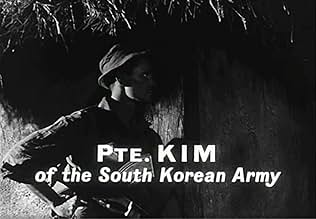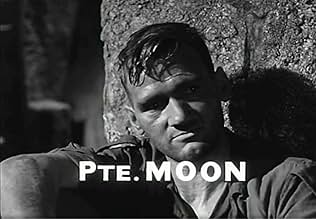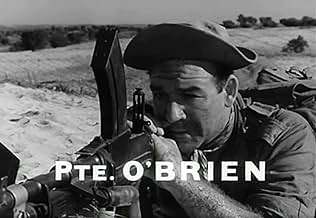During the Korean War retreat in 1951, a small British recon group is surrounded by Chinese troops and holds out in a lonely temple atop a hill.During the Korean War retreat in 1951, a small British recon group is surrounded by Chinese troops and holds out in a lonely temple atop a hill.During the Korean War retreat in 1951, a small British recon group is surrounded by Chinese troops and holds out in a lonely temple atop a hill.
Featured reviews
If nothing else this is a good little 50's British actioner. There's actually a couple of hills defended in the film. A smaller one in the first half by 4 of the soldiers and then a larger one in the second half, which is also the site of a Buddhist temple.
This is actually the first British war film I can remember seeing set in the Korean War. As others have mentioned, for a very much "B" feature, it has an A cast list, with the added bonus of seeing Robert Shaw and Michael Caine in a couple of their earliest roles. Keep your eyes peeled for Shaw, as his character doesn't last too long into the film.
It's a relatively brief film and the narrative doesn't delve much into the status of the platoon serving under the UN Flag, nor exploring to a great extent the fact that some of the soldiers were regular army and some were apparently national conscripts. The story really could have been fleshed out more. It's pretty lean and sparse, with very little backgrounding. But punters are unlikely to get bored watching it.
This is actually the first British war film I can remember seeing set in the Korean War. As others have mentioned, for a very much "B" feature, it has an A cast list, with the added bonus of seeing Robert Shaw and Michael Caine in a couple of their earliest roles. Keep your eyes peeled for Shaw, as his character doesn't last too long into the film.
It's a relatively brief film and the narrative doesn't delve much into the status of the platoon serving under the UN Flag, nor exploring to a great extent the fact that some of the soldiers were regular army and some were apparently national conscripts. The story really could have been fleshed out more. It's pretty lean and sparse, with very little backgrounding. But punters are unlikely to get bored watching it.
Stalwart little "Sunday Afternoon" war film with all the right ingredients - excellent cast of British character actors with requisite mix of seasoned pro's (Andrews, Landis, Maddern) and young up & comers (Boyd, Shaw, Caine), simple but gripping plot with salty "it's-a-dog's-life-in-the-army-but-orders-is-orders" dialogue, well staged action scenes, "friendly" US planes bombing British troops etc etc. Well worth an hour or so of your time.
It is said that the Korean War is the "Forgotten War." Most movies about it were made in the decade or so after the war, with the notable exception of M*A*S*H. Spielberg, Hanks, and Stone seem to be in no hurry to commemorate this conflict like the endless modern World War II and Vietnam movies. And if America's role in the war is mostly forgotten, almost no one remembers the UN allies, including Great Britain.
"A Hill in Korea," or "Hell in Korea," was made in 1956, about 5 years after the end of active combat. It portrays the travails of a patrol of mostly national servicemen (draftees) led by an inexperienced lieutenant and a pair of career NCOs. Naturally, they end up confronting an overwhelming Chinese force and are eventually besieged in a Buddhist monastery on a steep hill. A desperate battle ensues, reminding one much of the stand in "Sahara" or the very similar "The Steel Helmet," which was filmed 5 years earlier.
The film is mostly cliché, similar to a lot of US Korean War films. Only about three characters have any development about their home lives and dreams, usually just before they exit the scene for good. There is a very minor sub-plot with the radio operator who is ostracized after throwing away the unit radio. And there is a lot of good action. Unfortunately, this is one of those almost forgotten films that appears to have been poorly preserved and the version I saw was really low quality.
Other than action, what makes this film stand-out is the cast. You see stalwarts like Harry Andrews and Stanley Baker, rising stars like George Baker and Stephen Boyd, and the future 'M,' Robert Brown. It also featured some very young future superstars named Michael Caine and Robert Shaw. Altogether it features two future knighthoods and no less than 4 MBE/OBE/CBE holders. The cast alone makes this film worth a look.
As a side note, the film makes some points about the plight of the National Service men who were drafted to a war virtually unknown in the UK. Four years later the UK ended National Service for good and returned to a professional army. It is not overdone, but the film clearly was intended to raise questions about the post-WWII continuation of conscription.
"A Hill in Korea," or "Hell in Korea," was made in 1956, about 5 years after the end of active combat. It portrays the travails of a patrol of mostly national servicemen (draftees) led by an inexperienced lieutenant and a pair of career NCOs. Naturally, they end up confronting an overwhelming Chinese force and are eventually besieged in a Buddhist monastery on a steep hill. A desperate battle ensues, reminding one much of the stand in "Sahara" or the very similar "The Steel Helmet," which was filmed 5 years earlier.
The film is mostly cliché, similar to a lot of US Korean War films. Only about three characters have any development about their home lives and dreams, usually just before they exit the scene for good. There is a very minor sub-plot with the radio operator who is ostracized after throwing away the unit radio. And there is a lot of good action. Unfortunately, this is one of those almost forgotten films that appears to have been poorly preserved and the version I saw was really low quality.
Other than action, what makes this film stand-out is the cast. You see stalwarts like Harry Andrews and Stanley Baker, rising stars like George Baker and Stephen Boyd, and the future 'M,' Robert Brown. It also featured some very young future superstars named Michael Caine and Robert Shaw. Altogether it features two future knighthoods and no less than 4 MBE/OBE/CBE holders. The cast alone makes this film worth a look.
As a side note, the film makes some points about the plight of the National Service men who were drafted to a war virtually unknown in the UK. Four years later the UK ended National Service for good and returned to a professional army. It is not overdone, but the film clearly was intended to raise questions about the post-WWII continuation of conscription.
It's 1951, and the Allies are on the retreat from the Yalu, with massive Chinese forces pursuing them south. A small unit of British troops is sent to reconnoitre a Korean village, and gets caught by two advancing Chinese battalions.
For all the formulaic treatment of soldiers maintaining a chirpy stoicism in adverse combat conditions, this film does have a certain gritty realism. George Baker as the rookie lieutenant burdened by command, and Harry Andrews as the tough old sergeant, are first-class. Don't blink, or you'll miss a very young Michael Caine as Private Lockyer, lamenting the death of Corporal Ryker (Stanley Baker).
The film works as a simple narrative of men under fire, but it certainly has some shortcomings. The narration which launches events may save the time and effort of explaining the plot, but would it not have been better for this information to emerge naturally out of the drama? When the hut explodes, there is a very obvious jump-cut. During the interval needed to get the actor out of the danger area, someone jolted the camera! Would the Chinese soldiers, even with their advantage in limitless canon-fodder, attack so recklessly across open, flat ground? At one point, close-ups are inserted to enhance the human reactions of the soldiers, but the trouble is, the lighting conditions do not match those of the master shot. Once the British soldiers retreat to the temple on the hill, the whole proceedings become totally studio-bound, with Shepperton fibreglass passing for buddhist architecture. The air strike relies too heavily on monotonously-repeated library footage of American planes. When the ending comes, it is a surprise in the wrong sense - the resolution is unconvincing, almost as if the film-makers didn't know how to extricate the soldiers. Surely a few bombs wouldn't clear the Chinese away for miles around?
Ronald Lewis plays Wyatt, the misfit who didn't want to be a soldier and who gets everything wrong. This character is needed in one sense, because there has to be some internal tension within the British camp, but Wyatt is not well done. His apostasy is overly-dramatic, and his immolation utterly unbelievable. This attempt to inject gaudy emotion into a basically stiff-upper-lip story just doesn't come off.
Verdict - Interesting 1956 British 'take' on recent war which ultimately succeeds, despite its flaws.
For all the formulaic treatment of soldiers maintaining a chirpy stoicism in adverse combat conditions, this film does have a certain gritty realism. George Baker as the rookie lieutenant burdened by command, and Harry Andrews as the tough old sergeant, are first-class. Don't blink, or you'll miss a very young Michael Caine as Private Lockyer, lamenting the death of Corporal Ryker (Stanley Baker).
The film works as a simple narrative of men under fire, but it certainly has some shortcomings. The narration which launches events may save the time and effort of explaining the plot, but would it not have been better for this information to emerge naturally out of the drama? When the hut explodes, there is a very obvious jump-cut. During the interval needed to get the actor out of the danger area, someone jolted the camera! Would the Chinese soldiers, even with their advantage in limitless canon-fodder, attack so recklessly across open, flat ground? At one point, close-ups are inserted to enhance the human reactions of the soldiers, but the trouble is, the lighting conditions do not match those of the master shot. Once the British soldiers retreat to the temple on the hill, the whole proceedings become totally studio-bound, with Shepperton fibreglass passing for buddhist architecture. The air strike relies too heavily on monotonously-repeated library footage of American planes. When the ending comes, it is a surprise in the wrong sense - the resolution is unconvincing, almost as if the film-makers didn't know how to extricate the soldiers. Surely a few bombs wouldn't clear the Chinese away for miles around?
Ronald Lewis plays Wyatt, the misfit who didn't want to be a soldier and who gets everything wrong. This character is needed in one sense, because there has to be some internal tension within the British camp, but Wyatt is not well done. His apostasy is overly-dramatic, and his immolation utterly unbelievable. This attempt to inject gaudy emotion into a basically stiff-upper-lip story just doesn't come off.
Verdict - Interesting 1956 British 'take' on recent war which ultimately succeeds, despite its flaws.
The Korean war seems to have posed a bit of a problem with film makers . It wasn`t untill Vietnam that screenwriters and directors tried to profound statements on the nature of conflict and wear their anti war sentiments on their sleeves. To all intents and purposes you could rewrite any Korean war film script without any problem . Indeed you could change the place names and you`d have the exact same story , and that`s the problem with A HILL IN KOREA , it could be set during the North African campaign of 1941 or the Burma campaign of 1942 or the Italian campaign of 1944 and it`d be the exact same film. The only telling difference is if it`d been set during the Second World War it would have starred John Mills.
It`s the casting of this film that makes it memorable, we have early roles for stalwarts of British cinema in the 60s and 70s: George Baker , Harry Andrews, Stanley Baker and Percy Herbert . And very early appearances by Robert Shaw , Stephen Boyd and Michael Caine ( Caine actually being an UN soldier in the Korean war ) who would all make it big in Hollywood. Sadly that`s the only memorable aspect on this film about " The forgotten war " . Forgotten that is except for the people who survived it
It`s the casting of this film that makes it memorable, we have early roles for stalwarts of British cinema in the 60s and 70s: George Baker , Harry Andrews, Stanley Baker and Percy Herbert . And very early appearances by Robert Shaw , Stephen Boyd and Michael Caine ( Caine actually being an UN soldier in the Korean war ) who would all make it big in Hollywood. Sadly that`s the only memorable aspect on this film about " The forgotten war " . Forgotten that is except for the people who survived it
Did you know
- TriviaOpening credits prologue: "This film is dedicated to National Servicemen and Drafted Men of the Free Nations past, present and to come."
- GoofsThe troop enter a (mostly deserted) Korean village, finding a couple of innocent peasants. One soldier breaks the door of a shack, which the 'peasants' had booby trapped. The entry of the soldier and subsequent explosion are a jump cut, with the edit visible between the two shots, as the light and shadows had moved between filming each shot.
- ConnectionsFeatured in The Many Faces of...: Michael Caine (2011)
- How long is Hell in Korea?Powered by Alexa
Details
- Release date
- Country of origin
- Language
- Also known as
- An vorderster Front
- Filming locations
- Shepperton Studios, Shepperton, Surrey, England, UK(studio: made at Shepperton Studios. England.)
- Production companies
- See more company credits at IMDbPro
- Runtime
- 1h 20m(80 min)
- Color
- Aspect ratio
- 1.37 : 1
Contribute to this page
Suggest an edit or add missing content




































